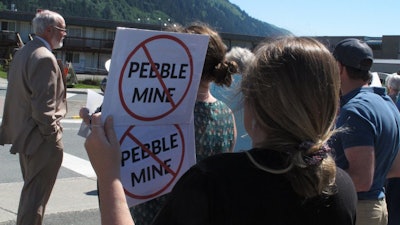
JUNEAU, Alaska (AP) — Alaska Gov. Mike Dunleavy said the state will appeal the U.S. Army Corps of Engineers' rejection of a key permit for a proposed copper and gold mine in a region that supports the world's largest sockeye salmon runs.
Dunleavy, in a statement Friday, called the corps' decision flawed and said the state has to keep a federal agency "from using the regulatory process to effectively prevent the State from fulfilling a constitutional mandate to develop its natural resources.”
The corps in November determined the project was “contrary to the public interest,” a finding lauded as the right one by Alaska’s U.S. senators, who, like Dunleavy, are Republicans. The corps' decision stood out following their release of an environmental review last summer that the developer of the Pebble Mine saw as positive and as laying the groundwork for key federal approvals.
Canada-based Northern Dynasty Minerals Ltd., which owns the Pebble Limited Partnership, the company working to advance the project, also has said it will pursue an appeal.
Alannah Hurley, executive director of United Tribes of Bristol Bay, said it's “pretty enraging" that Dunleavy “is proving that he will go above and beyond for this project.”
“It just shows how out of touch he is with Alaskans,” she said.
The U.S. Environmental Protection Agency has said the Bristol Bay watershed supports the largest sockeye salmon fishery in the world and contains significant mineral resources.
Under the Obama administration, the agency proposed restricting development in the region, though those restrictions were never finalized. The Pebble partnership argued the proposed restrictions were based on hypothetical mine plans and that the project should have a chance to go through the permitting process, a position some political leaders, including U.S. Sens. Lisa Murkowski and Dan Sullivan, sympathized with.
Murkowski in November called the corps' rejection of a permit “the right decision, reached the right way” and said it should “validate our trust” in the permitting process. Sullivan's office Friday said he stood by his statement in November that the corps "made the correct decision, based on an extensive record and the law, that the project cannot and should not be permitted.”
President-elect Joe Biden last year said if elected, he would work to stop the project. Biden takes office later this month.
Critics of the project found what they saw as an unlikely ally in President Donald Trump's eldest son, Donald Trump Jr., who agreed with calls to block the mine.
The Trump administration has moved to open additional land for oil and gas development in the National Petroleum Reserve-Alaska, held an oil and gas lease sale in the Arctic National Wildlife Refuge and announced plans to lift restrictions on logging and building roads in the Tongass National Forest, in southeast Alaska. The decision on Pebble was seen by many as an outlier.






















